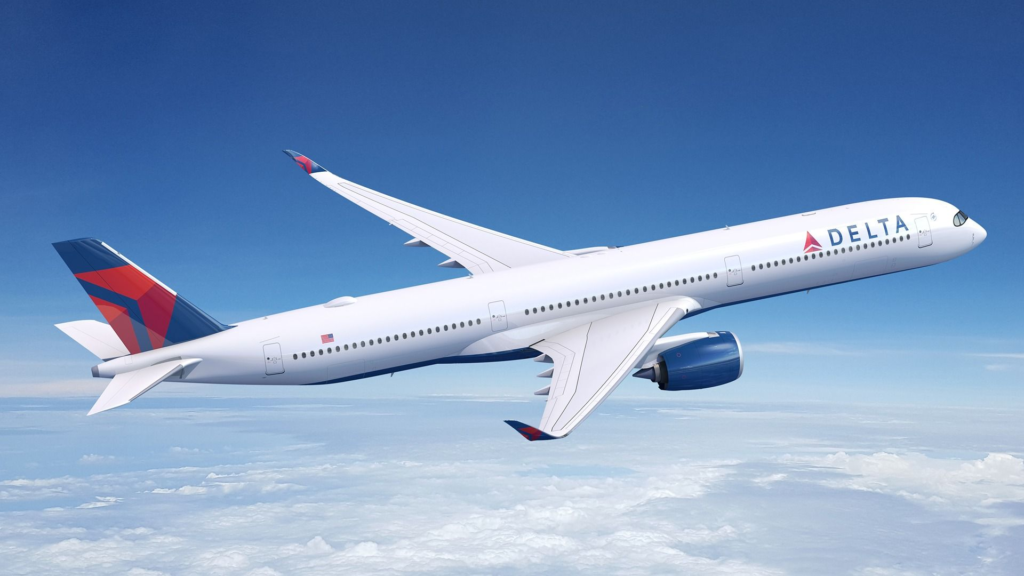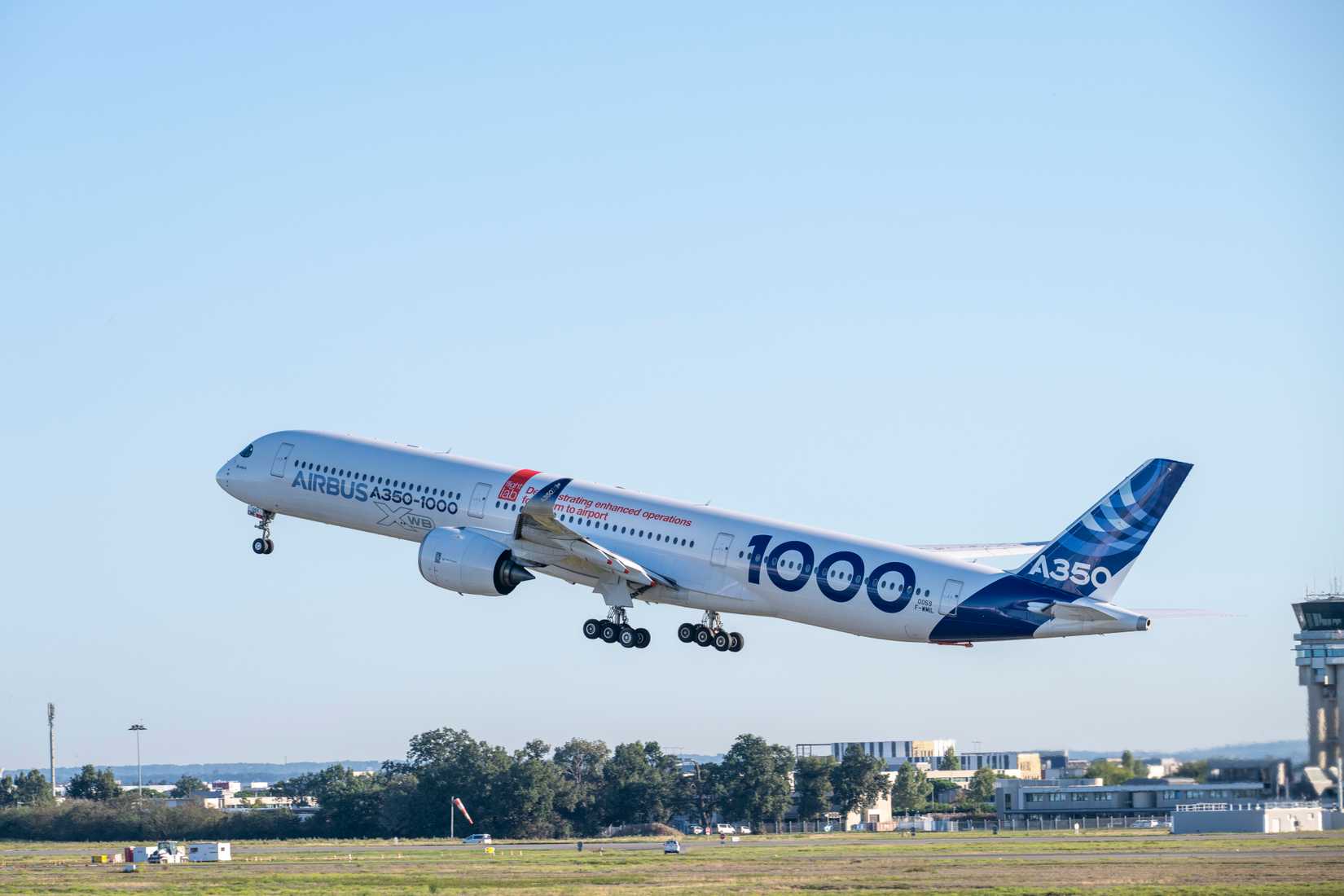![]() Delta Air Lines has placed an order for the Airbus A350-1000 in order to update its fleet, replace outdated aircraft such as the Boeing 767, increase passenger satisfaction, reduce expenses, and improve fuel efficiency. For long-haul flights, the A350-1000 is a perfect addition to Delta’s current fleet of Airbus A350-900s and A330s.
Delta Air Lines has placed an order for the Airbus A350-1000 in order to update its fleet, replace outdated aircraft such as the Boeing 767, increase passenger satisfaction, reduce expenses, and improve fuel efficiency. For long-haul flights, the A350-1000 is a perfect addition to Delta’s current fleet of Airbus A350-900s and A330s.
By switching to a widebody fleet that is primarily Airbus, Delta has reduced costs and improved operational flexibility by streamlining pilot training and maintenance. Because of its advanced aerodynamics and lightweight materials, the A350-1000 offers significant fuel efficiency advantages, lowering emissions and fuel burn while also lowering operating costs.
New long-haul international routes, including those to Australia, Asia, and the Middle East, will be made possible by Delta’s expanded payload and range. Additionally, the A350-1000 has better seats and more comfortable travel for passengers.
Dynamic Duo: Delta And Airbus
With the goal of increasing fuel efficiency and improving the in-flight experience, Delta expanded its fleet by ordering 20 new Airbus A350-1000 widebodies in 2024. By the end of the decade, the carrier plans to have over 60 A350s in its fleet, with 28 A350-900s and 36 A350-1000s. The largest and most powerful aircraft in Delta’s fleet, the A350-1000 will provide first-rate seats, top-notch amenities, and more cargo capacity.
Christian Scherer, Airbus Chief Executive Officer of the Commercial Aircraft business, commented on the stretch variant.
“We are thankful for Delta’s continued confidence in Airbus’ solutions to meet its fleet needs Delta now welcomes the A350-1000, which will open even more opportunities for the airline and its customers. We are proud that our aircraft serve the entirety of Delta’s impressive global network as this stellar airline takes fleet efficiency to the next level.”
The aircraft will mainly be used in international hubs and long-haul markets to support Delta’s global expansion. Along with 15% more premium seats than the retiring aircraft, the new aircraft will feature premium amenities, including Main Cabin, Delta One Suites, and Delta Premium Select. Delta Studio also offers over 1,000 hours of complimentary inflight entertainment, fast WiFi, and upscale food and drink selections.
Flyers will enjoy the A350-1000’s spacious and quiet cabin, high ceilings, expansive bin space and customizable ambient lighting designed to reduce fatigue and jet lag on long flights. With the commitments so far, Delta has almost 300 narrowbody and 50 widebody aircraft on order.
By The Numbers: A350-1000
The Airbus A350-1000 stands out for the passenger-focused “airspace” interior, its low airframe weight, and outstanding range. Its dimensions allow it to easily fit seamlessly with the gates and airport slots already made for older twinjets. Carbon-fire-reinforced composites make up over two-thirds of its structure, including: fuselage skins, spars, stringers, and even the wing’s 32-meter single-piece upper cover.
The airframe is lighter than virtually all its peers, free of corrosion, and has fatigue schedules that are significantly slower than those of an aluminum-alloy competitor. Inspection hours are reduced and less frequent, so airlines are able to fly longer blocks between thorough checks.
A high-aspect-ratio wing with smoothly curved sharklets and droop-nose devices to maximize airflow at low speed is supported by that lightweight framework. The design enables the A350-1000 to fly long-haul routes while using about a quarter less fuel than the four-engine types it is replacing. The Rolls-Royce Trent XWB-97 engines are also the most efficient large turbofans currently in commercial service.
|
Specification |
A350-1000 |
|---|---|
|
Max Pax seating |
480 seats |
|
Typical 3-class configuration |
375-400 seats |
|
Range |
9,000 nautical miles (16,700 kilometers) |
|
Cruise Mach |
0.85 |
|
Overall length |
242 feet (73.78 meters) |
|
Wing span (geometric) |
212 feet, 5 inches (64.75 meters) |
|
Height |
56 feet, 4 inches (17.08 meters) |
|
Max fuel capacity |
168,300 liters |
|
Max take-off weight |
322.00 tons |
The A350-1000 is also cost-effective enough to switch between medium- and long-distance routes during traffic slumps, if needed. The unrivaled combination of efficiency, flexibility, and comfort is exactly why the A350-1000 has become the preferred flagship for many international airlines in a time when regulators, investors, and passengers are all closely monitoring every kilogram of CO2 per seat.
Why Didn’t Delta Order The 777X?
Delta’s strategy of increasing fleet commonality with Airbus, and ongoing delivery delays with Boeing are some of the reasons why Delta selected the Airbus A350-1000 over the Boeing 777X. With the A350-1000, Delta was able to increase its long-haul efficiency and modernize its fleet on a schedule, while the 777X remains in the certification cycle.
The 777X’s scheduled 2020 launch has been postponed to 2026 and possibly even later. Problems include engineering issues with the GE9X engines, obstacles with the FAA, and other technical difficulties. Meanwhile, the increasing commonality of Delta’s Airbus fleet has streamlined operations, decreased crew training expenses and time, and increased cost and maintenance effectiveness.
Many carriers believe that the A350-1000 is a better fit for their hub-and-spoke models than the larger Boeing 777X. It performs better on ultra-long-haul flights and uses far less fuel than the older Boeing 777-200LRs and 767s that Delta retired. The “big three” US airlines have all shown little interest in the Boeing 777X. Delta and ![]() American Airlines declined to order any.
American Airlines declined to order any. ![]() United Airlines is also not expected to buy any, saying the aircraft is too big for its requirements.
United Airlines is also not expected to buy any, saying the aircraft is too big for its requirements.
The A350-1000 will replace the 767-300ER in Delta’s long-haul fleet. According to the Cranky Flier, that move is all about “cascading upgauging.” Flights currently operated by 767-300ER will transfer up to the 767-400ER/A330-200 while flights will be on the A330-300/900neo. Then it’s up to the A350-900, and those with the highest demand will fall to the A350-1000.
The move also makes it clear that the airline is not waiting for the 777X to finally be certified after years of delays. The massive Boeing will be the largest twinjet ever made once it finally enters production, but that is still not expected until 2026. Then it would take even longer for Delta to actually get their planes.
Tariffs In The Way Of Delta’s Airbus Fleet
Delta paused new Airbus aircraft deliveries from Europe and Canada while President Trump’s tariffs were in effect. This decision impacted the 20 Airbus A350-1000 widebody aircraft originally scheduled for delivery from Toulouse, France in 2026. Delta’s current fleet upgrade strategy has been significantly disrupted by uncertain tariffs that could increase aircraft costs by as much as 20 percent.
Currently, Delta operates 36 Airbus A350-900 aircraft with 15 more on order, according to Planespotters.net. Those are alongside the 20 larger A350-1000s and options for 20 additional frames. Airbus is the only aircraft manufacturer from which Delta has deliveries scheduled for the remainder of 2025. The airline was very clear that it won’t be paying tariffs on any aircraft deliveries we take.
In response to the uncertain economics, Delta reduced planned network growth and remains in flux with regard to capacity this year. Delta cites decreased spending on recreational travel as a key factor. The tariffs also impact Delta’s order for 131 Airbus A220-300 aircraft intended for domestic and short-haul international routes.
Trump’s Trade Policy Hurting Delta
Donald Trump’s return to the presidency in 2025 has had significant negative impacts on the global aerospace industry due to protectionist trade policies. Airbus CEO Guillaume Faury said in May 2025 that Europe should impose tariffs on imported Boeing aircraft and parts if the US persisted with its 10% tariff on new Airbus aircraft. Reciprocal tariffs were fortunately avoided, but not until the EU and Airbus took a hard stance against the Trump administration.
Guillaume Faury, Airbus’ Chief Executive Officer, commented in a report by Reuters that September will be a crucial month in determining whether Airbus meets its annual goal.
“We are producing aircraft in line with our plans but deliveries are backloaded as we face persistent engine supply issues on the A320 programme. The operating environment is complex and fast-changing. On tariffs, the recent political agreement between the EU and the US to revert to a zero-tariff approach for civil aircraft is a welcome development for our industry. Our 2025 guidance, which continues to exclude the impact of tariffs, remains unchanged.”
The US federal courts have recently ruled that most of Trump’s tariffs are illegal. The president launched an appeal to the higher court in a bid to reverse the decision and save his trade policies. According to CNBC, the US Court of Appeals for the Federal Circuit ruled that Trump overstepped his authority with steep duties on almost every country in the world.
That is good news for Airbus and Delta, meaning that even if Trump were to change his mind in his mercurial style, he would not have the power to implement new tariffs. Delta will benefit from stability and a return to the free, open, and untaxed trade of global aerospace products when it finally takes delivery of its new flagship A350-1000s.








